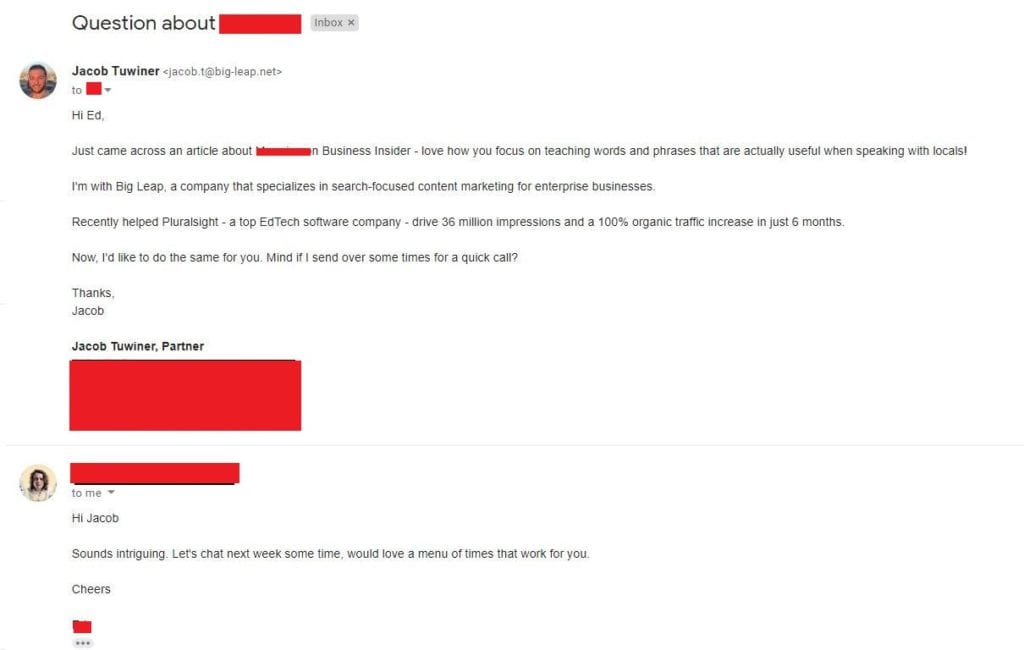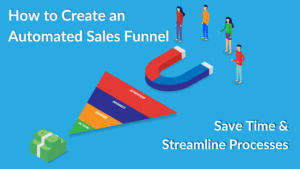Last updated on October 29th, 2024

In this article, we’ll be going over a discovery call script, and questions you should ask, to start a sales call.
A good doctor wouldn’t prescribe you medication without running a diagnosis and checking you out first. And it’s the same thing for sales.
You might have heard of the saying, “I could sell ice to an Eskimo.” Well, that’s impressive, and all, but an Eskimo probably doesn’t need ice.
Here’s the truth:
Sales is all about providing transparent value to solve someone’s problems.
Maybe you’re witty enough to sell something to someone who doesn’t even need it, but this is a disastrous long-term plan. Your smooth talking will most likely only leave your client unsatisfied and misled.
If you need help running a more successful sales discovery call, this 10-step guide is for you.
Let’s jump right in.
Download Discovery Call Template Now:
What Is A Discovery Call?
A discovery call is the first call of a sales process in which you’re not trying to sell a prospect anything.
The goal of this first call? Listen to your prospect’s problems and find out their goals.
I repeat:
A discovery call is not about selling a prospect your product or service on the first call.
The goal is to be more like a doctor and less like an annoying vendor that tries selling anything to anyone walking past their mall booth.
The exception here is if your lead is warm (maybe it’s a referral lead), and they initiate the sale first. But other than that, sales should be something you take your time with because time builds trust.
So like a doctor running a diagnosis, the first step of a sale is the discovery phase. Once you properly learn about your prospect’s problems and goals, you can schedule the next call to discuss a customized proposal.
Why Should I Do A Discovery Call Anyway?
This first call will help you identify if this lead is the right fit for you and your offer. So if you think about it, it’s a win-win strategy that’s put in place to qualify a lead and help your prospect.
Remember:
Sales is all about transparently providing value.
Running a successful sales discovery call will be the best way to warm up your lead and increase your chances of closing a deal.
Once you learn to knock a discovery call out of the park, you can then move onto a proposal, then a contract or deal — then hopefully, it will be a closed sale.
And if you’re about to jump on a discovery call, this means you’ve identified your target market and have booked a meeting.
This brings us to the first step:
#1: How Do I Set Up A Discovery Call?
Chances are, everyone doesn’t need your product or service. And if you’re selling a service, you won’t want to work with everyone either.
So before you start booking discovery meetings, you need to identify exactly who you want to schedule meetings with.
The criteria of which someone or a company will qualify to be an ideal prospect is up to your business’s needs. But it’ll probably be up to several variables such as:
- The prospect’s goals
- The prospect’s pain points
- Niche
- Revenue & budget
- Personality & values
The list could really go on. Make sure you identify the type of businesses or people you want to work with before booking a meeting.
After you collect a pool of various prospects that fit your criteria, it’s time to start reaching out to the right people.
No, you don’t want to talk to anyone in a company. You want to make sure you’re contacting the decision-maker who calls the shots.
If you get on a call and the prospect tells you they have to talk to a higher-up, you’ve messed up the sales process's first step.
There are many ways to reach out to potential prospects, whether through social media like LinkedIn or classic email. (You can never go wrong with email.)

Photo courtesy of Jacob Tuwiner.
Cold outreach in itself is an art. But the main gist of it is, reach out with a personalized message, provide value, then introduce yourself, and then ask if they’re interested in booking a time for a meeting.
#2: Do Your Homework
Okay, awesome! You’ve successfully booked a meeting with your ideal prospect.
Now it’s time to do some “investigating” (some call it online stalking) of the person (or people) you’re getting on the phone with.
Later we’re going to talk about building rapport with a prospect — one of the easiest ways to get a prospect to like you early on.
So what’s the best way to build rapport with a complete stranger?
Doing a little searching around the internet to learn more about the company and the person’s (who you’ll be talking to) interests.
This will be key to not sounding like a robot or starting a call sounding like a generic template. Boring…
Check out the company's websites and social media and of the people, you’ll be talking to. Find out what your prospect is all about.
Good things to take note of could be:
- Company accomplishments
- Personal accomplishments
- Company case studies
- Personal interests of the prospects (i.e., maybe they love their dog or just went on a trip to Morocco)
- Past and upcoming projects
It might sound ridiculous, but if you can strike a 30-minute conversation about their beloved black labrador, you’ll have already broken the ice on the call.
It’s best to choose what you think the prospect will be most passionate about — sometimes relevant — sometimes a little random.
#3: Match The Tone And Enthusiasm Of The Prospect
A big part of sales boils down to people skills and psychology.
You might read other articles where they tell you to sound as “enthusiastic as possible” when you get on the phone with a prospect.
Makes sense, right? If you’re selling something you should be psyched about it.
However, this could risk coming off as fishy or disingenuous if you get on a call overly enthusiastic.
Does this mean you should sound mopey and uninterested on a call?
You shouldn’t do that either.
You should try to match the tone in their voice and somewhat of their facial expression (if it’s a video call).
People like to be understood. And an easy way to display empathy right off the bat is to match their tone of voice.
Although you should try to open with a smile (even if it’s an audio call, people can still hear if you’re smiling by the way you speak), you’ll want to match their tone and enthusiasm to give off an “understanding” type of effect.
Showing empathy, as you’ll find out, is essential to any negotiation or sales process.
And when you take into consideration that 55% of salespeople lack empathy, this simple strategy can go a long way.
#4: Value Proposition & Setting Up The Guidelines For The Discovery Call
Once the tone of the call is set, you’ll want to try to step up and set up the guidelines for the call.
What I mean by this is, you want the prospect to understand this is a discovery call.
To start a call, you’ll want to tell them this is a 2-call process, assuming both parties want to work together after the first call. Tell them this first call is for you to learn more about their goals and pain points. And then, on the 2nd call you’ll prepare a customized proposal based on what you learned on the sales discovery call.
This is the best thing you can do to avoid being forced into “interview mode” right away, where the prospect will lead the conversation by asking you a bunch of questions.
You’ll also start to build trust since it shows you’re not some random money-hungry salesperson, only caring about making a sale. You’re different. You’re okay with going at a slower pace.
The goal is for you to lead the conversation by asking questions and actively listening to what they say.
After you’ve set the “guidelines” for the discovery process, if the prospect is a cold lead (meaning they don’t know who you are or need your service), you’ll want to give them a value proposition.
A value proposition will be a short 1-2 minute introduction of who you and your company are, what you do, who you help, and a case study of yours that’s relevant.
Don’t spend too much time on this part. You don’t want to bore the person by you talking about yourself.
The discovery call is all about the prospect, so make it quick and brief. Only explain and give more details if they ask.
#5: Build Rapport, Listen, & Empathize
After you have the quick introduction and value proposition out of the way, it’s time just to be a person, try to chat, and empathize with what they have had to say.
Building rapport comes naturally to some people, and for the more introverted people, it can be a little more complicated.
But that’s precisely why we told you to do your homework.
Now is the time to ask an open-ended question about their accomplishments to build some rapport. Open-ended questions usually start with “what” or “how.” So this means no yes-or-no questions.
Listen to what they have to say and answer back by summarizing what they just said to show them you’re listening. Getting them to open up and listening to what they have to say will facilitate some early trust and start a relationship.
However, sometimes, you’ll come across people who are strictly business and are only interested in how you can make them money. This is completely okay. It’s just more of a more direct approach.
Important empathy tip: Never interrupt the prospect while they’re talking. Hear them out to the fullest and reflect to them what you understand.
#6: Good Discovery Questions To Ask
Everything up to this point may have gone by in a couple of minutes, or maybe it took 20 minutes — it’ll vary.
Now it’s time to get to business and to start asking questions.
But keep in mind:
The discovery questions you ask will depend on your business and what it does. But for the most part, you’ll want to ask questions regarding:
- What role does the person you’re talking to have in the company (make sure you’re talking to the decision-maker).
- What their current pain points are.
- What they tried in the past to solve those problems.
- Past experiences with similar services to yours.
- What their goals are.
- What are they currently working on.
- How much do they currently spend on services similar to yours.
- What their budget is.
Notice these are all open-ended questions that require an in-depth answer.
Think of versions of these questions specific to your business and write them down, so you remember to ask them on the sales discovery call.
#7: Listen & Empathize More
Although you should ask as many questions as necessary to understand your prospect’s problems and goals, it’s important not to bombard them with all of the questions.
And after you ask an essential discovery question, comes the most crucial part — listening.
Sounds simple enough. But for some reason so many people get caught up thinking they need to sell something, they forget this important step.
Think about it:
Studies show that 68% of people say they're more likely to be sold if the salesperson listens to their needs.
After your open-ended questions, actively listen to what they have to say and take notes (or you could record the call to review later).
Dig deeper with more questions if you don’t completely understand their message. Then pause and empathize by summarizing what they told you.
#8: Handle Objections
Some prospects are rather easy-going, while others may be curious and loaded with questions.
You should be prepared for both.
Objections are part of sales. And it’s more than okay if you find out that you’re not the right fit for each other. Always be prepared to walk away.
Often enough, these objections are about numbers.
The numbers can be important, but they may not be easy to answer depending on your experience or service.
So here are two easy ways to handle objections and questions about numbers:
- Ask counterquestions. When asked a difficult question, usually, the best thing to do is ask an open-ended question back.
Here’s an example:
You might be asked, “How long will it take your service to get me results?”
A good counterquestion would be something like, “How fast would you like me to go?”
This will provide better insight to give a better answer to the curious prospect.
But if that fails:
- Give a range. Getting backed into a corner with a question can be nerve-racking. But giving a range instead of a specific number gives you leeway and makes you seem more reasonable.
Here’s how you can do it:
If someone were to ask you the price of one of your services (knowing every situation is different, so an exact quote is hard to pull off of the top of your head), give a range.
Instead of giving them a random number hoping it’s good, you can provide them with a range that works for you and is comfortable.
But if all else fails:
- Admit you can’t give an accurate answer right now. You might be scared to say the words “I don’t know,” but it’s still okay to say.
It’s better to be transparent that you don’t know something than to give an inaccurate response.
#9: Ask For Feedback & Schedule The Next Call
There are going to be hits and misses.
But even a miss on a sale can still be a valuable learning experience.
After you’ve listened and asked all of the questions you needed to, ask for feedback on what you did that they liked and what they didn’t like. This is especially good to do when you’re less experienced in either sales or what it is you're selling.
Before you end the call and you feel a lead is qualified, you need to schedule the next appointment while on the discovery call. You want to nail down the date and time, and let them know the next step. Most of the time, it’ll be a customized proposal.
Failing to schedule the next call can mean missed opportunities.
However, if you feel the lead isn’t qualified or don’t think you can help them, be honest. Don’t be shy about politely ending the call. If you want, recommend them something that will solve their problems — kindness and honesty go a long way.
#10: Evaluation & Follow-Up
After the call is over, pat yourself on the back. It doesn’t matter whether it went well or not.
In the worst-case scenario, you just got some practice to become better at sales.
If you recorded the call, you can review it to see if you could do anything better. And if you successfully scheduled a proposal call — congratulations!
How Long Should A Discovery Call Be?
The duration of a discovery call will vary. It’s a good practice to set a flexible call time duration beforehand.
However, the most important thing is to make sure you did well on your side of the discovery process.
Utilize Tools To Help Your Sales Funnel
Sales can be a fun or nerve-racking experience; just remember to stay calm and never get worked up over one call. There will always be the next one.
Using the right software tools can help simplify and automate your sales funnel.
VipeCloud has numerous solutions to help schedule, automate, and gain valuable insight into your marketing and sales campaigns. Not sure if VipeCloud is right for you? Request a FREE demo here.




Leave a Reply